Asia-Pacific Trade and Investment Report 2018: Recent Trends and DevelopmentsThe Asia-Pacific Trade and Investment Report provides information and independent analyses of regional trends and policy developments in trade, goods, and commercial services. In 2018, the Asia-Pacific region increased its share of global merchandise trade. Intraregional and interregional trade also accelerated in Asia-Pacific. As trade among and with North, Central, and South Asia still involve high costs, more cooperation is needed on digitalization of trade processes. Author: United Nations Economic and Social Commission for Asia and the Pacific Year: 2018 Download Tags: South Asia, Trade Facilitation Agreement, WTO, SAARC, UNESCAP World Trade Report 2018: The Future of World TradeThe report looks at international trade and analyzes how digital technologies will reduce trade costs. It examines the internet of things, artificial intelligence, 3-D printing and blockchain, and speculates how these things will affect global trade in the next 15 years. It looks at indicators on South Asia and other regions to help evaluate each region’s preparedness for the digital age. Author: World Trade Organization Year: 2018 Download Tags: South Asia, Trade Facilitation Agreement, WTO Trade Profiles 2018This report presents key indicators on trade in goods and services, highlighting the major exports and imports for each economy as well as their main trading partners. It gives a snapshot of the importance of trade in the economy and gives information on total trade flows. The report includes trade profiles for 197 economies, including Bhutan, Maldives, Myanmar, and Nepal, and covers data on trade per capita, world ranking in exports and imports, and trade in commercial services. It also covers data on patent, trademark, and industrial design applications for each country. India ranks 8th in exports of commercial services, while Bangladesh ranks 49th in imports of merchandise. Sri Lanka ranks 69th in exports of commercial services. Author: World Trade Organization Year: 2018 Download Tags: Trade, WTO Reinvigorating Trade and Inclusive GrowthThis report offers insights into how trade benefits the poor, those in rural areas, micro, small, and medium-sized enterprises, and women. It also shows how productivity and living standards could be raised through greater openness in key areas, such as services trade and e-commerce. The report goes on to suggest that trade policies should aim to build greater openness and urge countries to reinvest in open, rules-based global trade. Author: International Monetary Fund, World Bank, and the World Trade Organization Year: 2018 Download Tags: India, Regional Cooperation, Trade Facilitation Agreement, WTO World Trade Statistical Review 2018World Trade Statistical Review 2018 presents the latest developments in world trade, with analysis of recent trends for trade in goods and services. It looks at the performance of developing economies, where merchandise exports increased by 12% in 2017. The book also looks at value-added exchanges and digital trade, and provides data on trade-facilitating measures and on the implementation of regional trade agreements, such as the South Asian Free Trade Area. Author: World Trade Organization Year: 2018 Download Tags: Trade Facilitation Agreement, WTO, UNCTAD Trade Rules in E-commerce: WTO and IndiaRegulations for e-commerce is evolving in India and the rest of the world. This paper traces the growth of the e-commerce sector in India, developments in the WTO, and India’s position. It finds that while trade rules in India are more liberal than in other countries, India needs to address gaps and inconsistencies in the regulations. It also recommends that India join the negotiations on trade rules. Author: Arpita Mukherjee and Avantika Kapoor Year: 2018 Download Tags: ADB, India, Trade Facilitation Agreement, WTO Trade Facilitation and Innovation: Evidence from South Asia Subregional Economic Cooperation CountriesThis paper looks at trade and its effects on innovation. Its analysis of firm-level data from Bangladesh, India, and Nepal shows that shorter trade times add competitive pressure from world markets and induces firms to innovate, hence associated with introduction of new products and new management systems. The results suggest that policies that improve trade facilitation would support long-term growth in South Asia Subregional Economic Cooperation countries. Author: Ben Shepherd, Utsav Kumar, and Roselle Dime Year: 2018 Download Tags: Bangladesh, India, Nepal, SASEC, Trade Facilitation Agreement, WTO, ADB RCI The Digital Transformation and the Transformation of International TradeAs new modes of trade emerge from developments in the digital economy, new regulatory concerns arise regarding privacy, ensuring tax neutrality across different modes of trade, and competition. This paper considers the different approaches to these issues by different countries and country partnerships. It studies modes of trade in the digital era, categorizes concerns identified by stakeholders and governments, and reviews how regional trade agreements are working to address these concerns. Author: Dan Ciuriak and Maria Ptashinka Year: 2018 Download Tags: Trade, WTO Impact of Implementation of Digital Trade Facilitation on Trade CostsThis paper studies of the effect of the implementation of World Trade Agreement Trade Facilitation Agreement (WTO TFA) measures on trade costs in the Asia-Pacific region. Its analysis shows that full implementation of measures is associated with 15% reduction in trade cost. The paper also projects a 26% decrease in trade costs, amounting to $600 billion annually, with the full implementation of WTO TFA measures together with digital trade facilitation measures. It also looks at the need to develop legal and technical frameworks to support cross-border paperless trade, including the legal recognition of trade data and documents between public and private organizations in different countries. Author: Yann Duval, Chorthip Utoktham, and Alexey Kravchenko Year: 2018 Download Tags: Trade Facilitation, Trade Facilitation Agreement, WTO Digital Trade Facilitation in Asia and the Pacific: Studies in Trade, Investment and InnovationDigital trade facilitation is reducing trade costs for developing economies, allowing them to use trade as an engine of growth and sustainable development. This report provides an overview of trade facilitation and paperless trade implementation in the Asia-Pacific region. It analyzes the impact on trade costs of trade facilitation measures and reviews paperless trade provisions in recent regional trade agreements. Among the countries surveyed are Bangladesh, Bhutan, India, Maldives, Nepal, and Sri Lanka. Author: United Nations Economic and Social Commission for Asia and the Pacific Year: 2017 Download Tags: Bangladesh, Bhutan, India, Maldives, Nepal, Sri Lanka, Trade Facilitation Agreement, WTO National Trade Facilitation Committees: Beyond Compliance with the WTO Trade Facilitation Agreement?This study presents analysis of 59 national trade facilitation committees from around the world, based on a survey by the United Nations Conference on Trade and Development. It outlines how countries are applying the World Trade Organization Trade Facilitation Agreement article number 23.2 relating to the formation of national committees on trade facilitation. The study includes analysis of national trade facilitation committees’ institutional frameworks, composition, gender mainstreaming policies, communications activities, and financing sources. It also gives a summary of outcomes, obstacles faced, and lessons learned by the committees. Author: United Nations Conference on Trade and Development Year: 2017 Download Tags: Sri Lanka, Trade Facilitation Agreement, Transport, UNCTAD, WTO Extra Time: Trade Insight, Vol. 13 No. 2, 2017Trade Insight is published by the South Asia Watch on Trade, Economics and Environment. This issue’s main feature examines the special and differential treatment (S&D) provisions, which give least developed countries flexibilities in implementing WTO Agreements. The issue also includes features on trade integration among landlocked developing countries and the proposal to facilitate trade in services. Author: South Asia Watch on Trade, Economics and Environment Year: 2017 Download Tags: Regional Integration, South Asia, Trade Facilitation Agreement, WTO 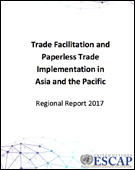 Trade Facilitation and Paperless Trade Implementation in Asia and the Pacific - Regional Report 2017Paperless trade reduces trade costs and enables trade to drive growth and sustainable development. This report shares results of the global survey on trade facilitation and paperless trade implementation, covering 44 countries in Asia and the Pacific. It covers 47 trade facilitation measures, including those involving general trade, paperless trade, cross-border paperless trade, transit, and trade for small and medium-sized enterprises. The report gives an overview of trade facilitation implementation in South and Southwest Asia, and includes Bangladesh, India, and Myanmar in its analysis of transit measures in Asia and the Pacific. Author: United Nations Economic and Social Commission for Asia and the Pacific Year: 2017 Download Tags: UNESCAP, Bangladesh, India, Least Developed Countries, Maldives, Myanmar, Small and Medium Enterprise, Trade Facilitation Agreement, Transport Facilitation, WTO The Asian Economic Integration Cooperation Agreement: Lessons for Economic and Social DevelopmentThis paper focuses on the impact of regional integration on development and poverty reduction in the Association of Southeast Asian Nations (ASEAN) economic community. It examines economic growth, rapid trade, and investment expansion and looks at challenges presented by the deterioration in trade balances in Cambodia, Laos, Myanmar, and Vietnam. It also explores the role of regional integration in addressing the development gap in ASEAN countries. Author: Amelia U. Santos-Paulino Year: 2017 Download Tags: ASEAN, Free Trade Agreements, Least Developed Countries, Myanmar, Regional Cooperation, Regional Integration, WTO Trade Profiles 2017Trade Profiles 2017 provides a series of key indicators on trade in goods and services for 196 economies, highlighting major exports and imports for each economy as well as their main trading partners. It provides a concise overview of global trade for each profile, showing detailed information about merchandise trade flows. It also features an expanded section on trade in commercial services and statistics on intellectual property. Author: World Trade Organization Year: 2017 Download Tags: GDP, Trade, WTO Measuring and Analyzing the Impact of GVCs on Economic Development (English)This report shows how the global economy is changing continuously and rapidly. It attempts to give a detailed picture of the dynamic network structure of the global economy, and tries to show how economies link up, specialize, and grow, in light of global value chains. It explains the difference between elements of an economy that are tradable and those that are non-tradable, while also presenting a picture of evolving patterns of independence. Author: Asian Development Bank Year: 2017 Download Tags: Development, WB, WTO 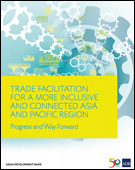 Trade Facilitation for a More Inclusive and Connected Asia and Pacific Region: Progress and Way ForwardThis report gives an overview of assessments from the 2017 global survey on trade facilitation and paperless trade in Asia and the Pacific. It looks at the implementation of trade facilitation and paperless trade measures in 44 countries in Asia and the Pacific, including how the South Asia Subregional Economic Cooperation Trade Facilitation Strategic Framework promotes development by deepening regional cooperation. The Framework covers national and subregional projects in Customs harmonization, improving cross-border facilities, and transport facilitation. The Framework also supports regulatory reforms and the development of the National Single Window Customs management system in Bangladesh, Bhutan, Maldives, and Nepal. Author: Asian Development Bank and United Nations Economic and Social Commission for Asia and the Pacific Year: 2017 Download Tags: ADB, Bangladesh, Bhutan, BIMSTEC, Maldives, Nepal, Regional Cooperation, Regional Integration, SAARC, SASEC, Standards Harmonization, Trade Facilitation, Trade Facilitation Agreement, WTO, UNESCAP, ADB RCI 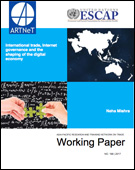 International Trade, Internet Governance and the Shaping of the Digital Economy (AWP No. 168)The connection between trade and internet governance presents complex policy challenges in today’s digital economy. This working paper highlights several observations and findings on the complex relationship between international trade and the internet. It recognizes the fact that the internet is not only driven by economic factors, but is a complex phenomenon shaped by political and social engagement, technical efficiency, and cultural and moral considerations. It sees the importance of synergizing international trade and the internet, and recommends that the World Trade Organization and other trade institutions develop mechanisms to consult internet governance institutions such as the Internet Engineering Task Force, World Web Wide Consortium, Internet Corporation for Assigned Names and Numbers, International Telecommunications Union, Internet Society, and the Internet Governance Forum. Author: Neha Mishra Year: 2017 Download Tags: ICT, Trade Facilitation, UNESCAP, WTO 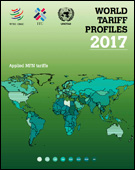 World Tariff Profiles 2017World Tariff Profiles is a joint publication of the World Trade Organization (WTO), International Trade Centre, and the United Nations Conference on Trade and Development devoted to information on market access for goods. It contains comprehensive data on tariffs and non-tariff measures imposed by over 170 countries and Customs territories. This year’s edition takes a close look at export diversification, analyzing to what extent economies have diversified their exports over time. Many countries make it a policy to diversify exports to obtain bigger market shares. An overview of export diversification shows how India, Myanmar, Sri Lanka, Bangladesh, and Bhutan have grown in the last two decades. Bangladesh in particular has achieved significant increase in terms of both product coverage and market reach. Author: World Trade Organization, International Trade Centre, and the United Nations Conference on Trade and Development Year: 2017 Download Tags: Bangladesh, Bhutan, Export, India, Maldives, Myanmar, Nepal, Sri Lanka, Tariffs, Trade, UNCTAD, WTO World Trade Statistical Review 2017The World Trade Statistical Review looks at the last 10 years and examines the latest developments in world trade, with a detailed analysis of the most recent trends for trade in goods and services. The book gives information on the participation of India, Bangladesh, and other South Asian economies in world trade, and highlights trends in the use of trade-facilitating measures. It also gives information on the implementation of the WTO Trade Facilitation Agreement and regional trade agreements, such as the South Asian Free Trade Arrangement. Author: World Trade Organization Year: 2017 Download Tags: Export, Least Developed Countries, Aid for Trade, SAFTA, South Asia, Trade Facilitation, WTO, Bangladesh, Bhutan, India, Maldives, Myanmar, Nepal, Sri Lanka Digital Trade Facilitation: Paperless Trade in Regional Trade AgreementsMost regional trade agreements now feature one or more measures for electronically exchanging trade-related information. These measures are becoming essential to maintaining trade competitiveness and enabling effective participation in cross-border e-commerce. This paper examines the extent to which measures enabling paperless trade are included in regional trade agreements (RTAs), such as the Association of Southeast Asian Nations-India Free Trade Agreement. India leads the region with the highest number of RTAs involving paperless trade measures. Asia-Pacific RTAs now increasingly cover specific areas of paperless trade such as electronic certificates of origin and sanitary and phytosanitary certificates. Author: Yann Duval and Kong Mengjing Year: 2017 Download Tags: ADB, ASEAN, Free Trade Agreements, India, Regional Cooperation, Trade Facilitation, UNESCAP, WTO SME Competitiveness Outlook: Meeting the Standard for TradeStandards and regulations for goods and services are important to international trade and value chains. They ensure consumer protection, determine compatibility, and promote environmental sustainability. This SME Competitiveness Outlook focuses on helping small and medium-sized enterprises (SME) make the most of standards and regulations to increase their competitiveness. Findings include strategies for SME managers on selecting and implementing standards and regulations, and an action plan for policymakers and trade and investment support institutions involved in aiding SMEs compete in markets where standards and regulations matter. Author: International Trade Centre Year: 2016 Download Tags: Trade, Small and Medium Enterprises, Bangladesh, India, Nepal, Sri Lanka, WTO, Global Value Chains World Trade Report: Levelling the Trading Field for SMEsParticipation in international trade, once exclusive, can progressively become more inclusive. But while new opportunities are opening up for small to medium-sized enterprises (SMEs), old barriers to international trade remain. This report highlights national and international policy actions that would enhance the ability of SMEs to participate in world markets more effectively. It says that for open trade and global integration to fully benefit everyone, it is crucial to ensure that all firms—not just large corporations—can succeed in today’s global marketplace. Author: World Trade Organization Year: 2016 Download Tags: Trade, WTO, Small and Medium Enterprise, Global Value Chains Implementing the Trade Facilitation Agreement: From Vision to RealityLow income to upper-middle income countries stand to gain a 14.6% to 16.5% reduction in trade costs upon implementation of the World Trade Organization's (WTO) Trade Facilitation Agreement (TFA). This publication looks at progression of the TFA – from conclusion of the talks at the 2013 Bali Ministerial Conference to preparations for the Agreement to take effect, as the valedictory moment of the TFA's entry into force nears. It highlights milestones, discusses the state of the ratification process, reviews implementation schedules, and examines work still to be done. Author: Nora Neufeld Year: 2016 Download Tags: Trade Facilitation, WTO, Least Developed Countries, Import, Export Trade Costs and Inclusive Growth: Case Studies Presented by WTO Chair-holdersThese contributions from participants of the World Trade Organization (WTO) Chairs Programme—which supports trade-related activities by academic institutions in developing countries—offer insightful research on opportunities that open up for developing countries when trade costs are reduced. Analyzing the potential impact of the WTO Trade Facilitation Agreement implementation in various developing regions of the world, this publication offers detailed country-level analysis on benefits of trade facilitation, including export diversification, greater global value chain participation, insertion of SMEs into international trade, the attraction of more foreign direct investments, and better governance. Author: Robert Teh, Maarten Smeets, Mustapha Sadni Jallab and Fatima Chaudhri, editors Year: 2016 Download Tags: Trade Facilitation, Global Value Chains, Small and medium enterprises, FDI, Governance, WTO Trade, Testing and Toasters: Conformity Assessment Procedures and the TBT CommitteeDuplication, delays or discrimination in Conformity Assessment Procedures (CAPs) can significantly increase trade costs: this risk is reflected in the growing importance of CAPs in World Trade Organization (WTO) discussions, and bilateral and regional free trade agreements. The paper uses new data on government-to-government discussions of CAPs in the WTO Committee on Technical Barriers to Trade (TBT) and studies trade issues that WTO members encounter with CAPs, based on specific trade concerns raised during 2010-2014. Author: Devin McDaniels and Marianna Karttunen Year: 2016 Download Tags: Technical Barriers to Trade, WTO, Trade Trade in Services: The Most Dynamic Segment of International TradeThe World Trade Organization (WTO) marks its 20th anniversary with a series of brochures to assist understanding of specific WTO agreements. This publication focuses on the WTO General Agreement on Trade in Services (GATS), which provides the legal ground rules for international trade in services, allowing WTO members the flexibility to open their markets to foreign competition to the extent of their choosing. GATS entered into force in 1995 and remains the only set of multilateral rules covering international trade in services. This brochures provides an overview of the different modes by which services are traded, commitments taken by WTO members, and developments enhancing GATS commitments and information on trade in services. Author: World Trade Organization Year: 2015 Download Tags: Services, Trade Facilitation, Economic Growth, WTO Technical Barriers to Trade: Reducing Trade Friction from Standards and RegulationsThe World Trade Organization (WTO) marks its 20th anniversary with a series of brochures to assist understanding of specific WTO agreements. This publication provides an overview of the WTO Agreement on Technical Barriers to Trade (TBT), which aims to ensure that technical regulations, standards, and conformity assessment procedures are non-discriminatory and do not create unnecessary obstacles to trade. It reviews how the TBT Committee, a unique multilateral forum for the discussion of standards and regulations affecting trade comprising WTO members, have created a predictable trading environment by enacting transparency provisions, and facilitated trade by encouraging WTO members to base their measures on international standards. Author: World Trade Organization Year: 2015 Download Tags: Technical Barriers to Trade, Trade, Trade Facilitation, WTO A Framework of Trade Policy for Bhutan: Compatible with the Gross National HappinessThis paper examines the compatibility between Bhutan's gross national happiness (GNH) index and trade policy, and attempts to contextualize Bhutan's trade policy issues - inclusive growth, trade facilitation, incidence of tariffs, and World Trade Organization accession. It explores trade and industry policy that is compatible with GNH guidelines, which aim to measure and improve people's holistic well-being: although it also includes factors that are seemingly unfavorable to an active trade policy. The report recommends benchmarking successful development strategies in other countries and creating an organization to pursue a more active trade policy to accomplish the urgent task of raising general living standards. Author: Inkyo Cheong, Taeho Bark, and Hoe Yun Jeong Year: 2015 Download Tags: Bhutan, WTO, Trade Policy, ADB World Trade Organization Annual Report 2015The World Trade Organization (WTO) Annual Report 2015 provides an overview of WTO activities in 2014 and early 2015. It presents a timeline of two decades of the WTO -- from its origins succeeding the General Agreement on Tariffs and Trade to its current role in the multilateral trading system. It presents a chapter on how WTO helps developing countries build trade capacity and allows them to implement trade agreements. WTO training courses are organized for officials from developing countries each year. Author: World Trade Organization Year: 2015 Download Tags: Trade, Trade Policy, WTO, Tariffs, Energy, Bangladesh, India, Nepal, Sri Lanka, Trade Facilitation, Transport, Asia, Agriculture 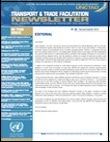 UNCTAD Transport and Trade Facilitation Newsletter No. 66 – Second Quarter 2015The Transport and Trade Facilitation Newsletter highlights trade facilitation support across countries and shares innovations from Cote d’Ivoire and Greece, including the new UNCTAD Technical Note on World Trade Organization (WTO) Trade Facilitation Agreement (TFA) ratification. It also features the meeting of the Global Facilitation Partnership for Transportation and Trade -- an event that brings together the private sector, WTO Member States and international organizations -- in a discussion to support TFA implementation. The Newsletter further shows United Nations Regional Commissions Global Survey on Trade Facilitation and Paperless Trade -- a response to the lack of comprehensive cross-country data and a guide to better understand and monitor trade facilitation implementation and paperless trade measures. Author: United Nations Conference on Trade and Development Year: 2015 Download Tags: Transport, Trade Facilitation, WTO, UNCTAD Aid for Trade at a Glance 2015: Reducing Trade Costs for Inclusive, Sustainable Growth High trade costs inhibit trade integration in various developing countries, slowing growth and development prospects. This joint OECD/WTO publication emphasizes the Aid-for-Trade Initiative as an example of how to reduce trade costs and contribute to the emerging post-2015 development agenda. It calls for redoubling of efforts to tackle the issue of trade costs that continue to marginalize many of the world’s poorest and most fragile economies. The chapters highlight main achievements and challenges of the Aid-for-Trade Initiative. It further suggests a focus on reducing trade costs for an integrated approach in achieving inclusive and sustainable development outcomes. Author: World Trade Organization and Organisation for Economic Co-operation and Development Year: 2015 Download Tags: Aid for Trade, Trade Policy, WTO WTO Dispute Settlement and Industrial PolicyThis paper explores the World Trade Organization's (WTO) dispute settlement mechanism in relation to the space it provides for Member countries’ industrial policies. It provides general conceptual reflections covering the role of WTO panels and the Appellate Body and the nature and categorization of WTO legal provisions applicable to trade in goods; and discusses how dispute settlement in WTO can affect or expand the policy space available to WTO Members in adopting industrial policy measures. This paper presents several examples that demonstrate the potential impact of WTO adjudicatory bodies on the policy space of WTO Members to implement and pursue industrial policy measures. Author: Jan Bohanes Year: 2015 Download Tags: WTO, Trade Facilitation, Policy Clean Energy and Access to Infrastructure: Implications for the Global Trade SystemThis paper focuses on how international trade rules could better accommodate renewable energy trade through fixed infrastructure. It explains the World Trade Organization disciplines relevant to trade in clean energy via fixed infrastructure, in particular General Agreement on Trade in Services disciplines on energy services and General Agreement on Tariffs and Trade transit rules. Finally, it suggests policy options to adopt existing rules to the challenges of integrating clean energy transported via fixed infrastructure. Author: International Centre for Trade and Sustainable Development Year: 2015 Download Tags: Energy, Trade, WTO, India, South Asia, Sustainability, Tariff 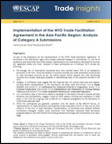 Implementation of the WTO Trade Facilitation Agreement in the Asia-Pacific Region: Analysis of Category A SubmissionsWorld Trade Organization (WTO) Trade Facilitation Agreement (TFA) provisions notified under Category A are those that WTO Member States have already implemented or have committed to implement by the time the Agreement enters into force or, in the case of the least-developed countries (LDCs), within a year of its entry into force. Provisions not included under this category are those which will require capacity building and technical assistance, or presumably take longer to implement. This trade insight paper analyzes Category A notifications of 15 economies in the Asia-Pacific region, contrasting the results with findings from an earlier ESCAP Survey on Implementation of Trade Facilitation and Paperless Trade (SITFAP) 2013/14 in order to examine some of the most challenging WTO TFA provisions, and gain insights on regional priorities for cooperation and capacity building. Author: Yann Duval and Pamela Bayona Year: 2015 Download Tags: Trade Facilitation, WTO, Least Developed Countries, UNESCAP World Tariff Profiles 2014This statistical yearbook devoted to market access for goods contains a comprehensive compilation of tariff parameters for each of the 160 World Trade Organization members, plus a number of other countries and customs territories where data is available. Each country profile presents information on tariffs
imposed by each economy on its imports, including an analysis of market access conditions in its major export markets. Statistics for all countries allow easy comparisons between countries and sectors, as well as between bound and applied tariffs. Author: World Trade Organization, International Trade Centre, and United Nations Conference on Trade and Development Year: 2014 Download Tags: WTO, Customs, Tariff, Bangladesh, India, Maldives, Nepal, Sri Lanka, Transport, Tariffs, Trade A World Trade Organization for the 21st Century: The Asian PerspectiveThis Asian Development Bank Institute book examines key changes in the world trading system and explores policy implications for Asia. Through a compilation of essays from prominent international and Asian trade experts, this book presents interaction of market forces and trade regulation. Lessons from the Asian experience offer new approaches and economic policies to sustain growth, presenting the World Trade Organization as a forum to improve regional and global trade governance in the 21st century. Author: Richard E. Baldwin, Masahiro Kawai, Ganeshan Wignaraja (Eds.) Year: 2014 Download Tags: Trade, Trade Policy, WTO, Bangladesh, Bhutan, Energy, India, Maldives, Nepal, Sri Lanka, Transport UNCTAD Transport Newsletter: Fourth Quarter 2014This United Nations Conference on Trade and Development (UNCTAD) newsletter focuses on the development dimension and benefits of the World Trade Organization Trade Facilitation Agreement. It includes sections on the national trade facilitation committees, project proposal for the implementation of trade facilitation measures contained in the agreement, and improvement in implementation of sanitary and phytosanitary measures to facilitate trade. It also includes UNCTAD’s contribution to trade facilitation in Landlocked Developing Countries and Small Island Developing States. Author: United Nations Conference on Trade and Development Year: 2014 Download Tags: Trade Facilitation, WTO, UNCTAD, Transport, Development, Sanitary and Phytosanitary Measures, Energy, India World Trade Report 2014 – Trade and Development: Recent Trends and the Role of the WTOThis annual publication highlights the relationship between trade and development, including changes since the start of the millennium. It identifies four key trends that altered the way trade affects development outcomes – accelerated economic growth in developing countries, expansion of global value chains, increase in agricultural and natural resource prices, and global nature of macroeconomic shocks. This report also explores how these trends have reshaped the role of trade in facilitating development and how recent development gains allow developing countries to adapt and mitigate risks. Author: World Trade Organization Year: 2014 Download Tags: WTO, Global Value Chains, Trade, Economic Growth, Agriculture, Trade Facilitation, Development, Bangladesh, Bhutan, India, Maldives, Nepal, South Asia, Sri Lanka 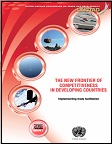 The New Frontier of Competitiveness in Developing Countries: Implementing Trade FacilitationThis report presents an overview of implementation challenges for realizing trade facilitation reforms. It consolidates results of 26 national trade facilitation implementation plans in 26 countries, comprising least developed countries, middle-income developing countries, landlocked countries, and small island economies in Africa, Asia, the Caribbean and Latin America. In the 26 countries surveyed, the level of implementation of trade facilitation measures in the World Trade Organization (WTO) is considerably lower in least developed countries (LDCs) than in developing countries. Since trade facilitation still remains a major challenge for developing countries and LDCs, an international legal regime with special and differential treatment will help developing WTO members achieve further progress. Author: United Nations Conference on Trade and Development Year: 2014 Download Tags: Trade Facilitation, Asia-Pacific, WTO, Bangladesh, Bhutan, Nepal Mega-regional Trade Agreements: Game-Changers or Costly Distractions for the World Trading System?This document explores the impact of regional trade agreements such as mega-regionals on countries that are not part of World Trade Organization negotiations. It focuses on trade-diverting effects of Trans-Pacific Partnership and Trans-Atlantic Trade and Investment Partnership such as the potential for multilateralization and discrimination. The report further explores potential impact of mega-regionals on Asia-Pacific, Sub-Saharan Africa, and Latin America. The latter sections highlight the opportunities and challenges in promoting coexistence of these future agreements with the multilateral trading system. Author: World Economic Forum Year: 2014 Download Tags: Asia-Pacific, Regional Trade, Trade Policy, India, WTO The Long and Winding Road: How WTO Members Finally Reached a Trade Facilitation Agreement The conclusion of the Agreement on Trade Facilitation at the Bali negotiations in December 2013 marked the end of a journey that lasted almost a decade. As the first multilateral trade agreement successfully negotiated by World Trade Organization (WTO) ministers, it broke new ground in the decentralized, bottom-up way the negotiations were structured; in the manner the capacities and resources of developing countries were addressed; and in how the Agreement has shifted the system’s focus beyond policy barriers toward process frictions. The negotiated outcome is likely to have an impact not just on Trade Facilitation, but on the WTO and the multilateral trading system as a whole. Author: Nora Neufeld Year: 2014 Download Tags: Trade Facilitation, Trade Policy, Regional Cooperation, WTO, India WCO News: WTO Trade Facilitation AgreementWCO News is a biannual newsletter of the World Customs Organization (WCO). This issue, released in June 2014, focuses on the World Trade Organization's (WTO) Agreement on Trade Facilitation. WCO's commitment to its implementation is highlighted and linkages between articles of the Agreement and WCO instruments and tools are explored. Also included is a feature on the benefits Authorized Economic Operator programmes bring supply chain companies. Author: World Customs Organization Year: 2014 Download Tags: Trade Facilitation, WCO, WTO, Bangladesh, Customs, India, Sri Lanka Globalization in an Age of Crisis: Multilateral Economic Cooperation in the 21st CenturyIs globalization in retreat, ask editors of Globalization in an Age of Crisis. Hosting discussions on multilateralism in trade and macroeconomic issues, the book considers international policy making following the global economic crisis of 2008-2009 that saw countries prioritize policy initiatives advancing national interests over international economic cooperation. Critical junctures are considered, including the current WTO round and whether it can deliver on its promise to improve trading prospects of developing countries (chapter 3), and the compatibility of preferential trade agreements (PTAs) with multilateral trading systems (chapter 4). Empirical assessments measuring the 'successes' of existing PTAs are also included. Author: Robert C. Feenstra and Alan M. Taylor Year: 2014 Download Tags: Trade Policy, Trade, Economics, WTO 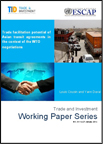 Trade Facilitation Potential of Asian Transit Agreements in the Context of the WTO NegotiationsFreedom of transit is an issue critical to landlocked developing countries whose lack of direct access to the sea has increased costs and lessened their competitiveness in international trade. To meet challenges arising from transit barriers, member states of the United Nations Economic and Social Commission for Asia and the Pacific recommend transit facilitation as part of an integrated approach to trade facilitation.
This working paper analyzes freedom of transit and transit facilitation in the context of trade and transport agreements in the Asia Pacific region, identifying good practices and weighing in on the extent to which existing agreements meet the provisions on transit facilitation stated in the draft text of the World Trade Organization Agreement on Trade Facilitation. Author: Louis Cousin and Yann Duval Year: 2014 Download Tags: Transport Facilitation, Trade Facilitation, WTO, Asia, UNESCAP, Bangladesh, Bhutan, India, Nepal Unpacking the Bali Package: a Snapshot of Bali Ministerial Decisions of WTO MembersThe Bali Package represents a key turning point for the World Trade Organization. Covering trade facilitation, agriculture, and trade issues for developing and least-developed countries, it is set to increase trade activity on a global scale and lower the cost of doing international trade. This paper acts as a precursor to its implementation by identifying challenges countries may face, giving a brief history of each pillar, exploring the next possible steps for each ministerial decision, and examining the likely effects of this decision/agreement on various other stakeholders, particularly on consumers. Author: Archana Jatkar and Chenai Mukumba Year: 2014 Download Tags: Trade, Trade Facilitation, Trade Policy, WTO, Agriculture, Least Developed Countries, India Unlocking Bangladesh-India Trade: Emerging Potential and the Way ForwardThis working paper breaks down the importance of trade cooperation between Bangladesh and India by taking a closer look at the impacts of Bangladesh's increased market access to India, and their improved border connectivity. Employing data from national government resources and multilateral development organizations including the International Monetary Fund, World Bank, and World Trade Organization, the study provides an estimate of the trade potential of Bangladesh and India, and calculates the implications on costs of trade facilitation, among others. It also discusses ongoing challenges in bilateral relations and provides recommendations that will enable larger gains for the two contiguous countries. Author: Prabir De, Selim Raihan, and Sanjay Kathuria Year: 2012 Download Tags: Trade, Trade Facilitation, Regional Cooperation, Bangladesh, India, WB, WTO, Bilateral Trade |



